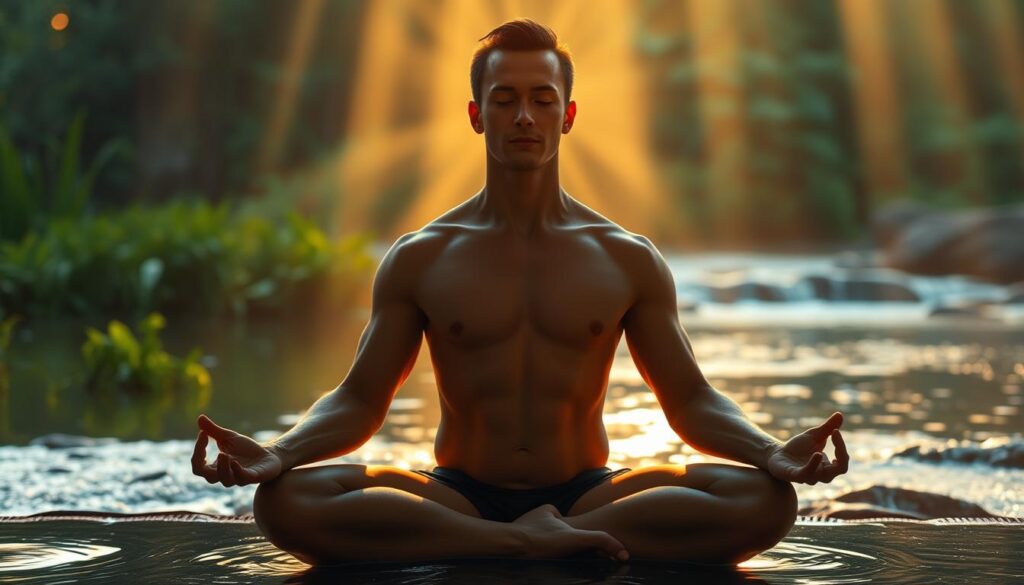Exploring meditation has shown me its deep impact on my mind and emotions. It helps reduce stress and boosts focus, as Jay Shetty points out1. This practice focuses the mind to reach a calm and clear state. It’s key to know that meditation, mindfulness, and relaxation go hand in hand2.
Adding these practices to our daily life can greatly improve our well-being. It’s estimated that half a billion people meditate regularly3.
To find peace of mind, understanding meditation’s benefits is crucial. It improves attention, reduces job burnout, and helps control diabetes2. Mindfulness exercises like body scan and walking meditation boost our awareness2.
Starting a meditation habit takes about 40 days. Beginners should aim for 10 to 20 minutes a day3.
Key Takeaways
- Effective meditation can reduce stress and increase focus1.
- Mindfulness techniques, such as body scan meditation, can enhance mindfulness and awareness2.
- Relaxation exercises, including guided meditations, can improve overall well-being3.
- Creating a new habit, such as daily meditation, typically takes about 40 days3.
- Estimates suggest that around half a billion people practice some form of meditation regularly3.
- Meditation apps and resources, including online bookstores and guided meditations, can support our meditation practice3.
My Journey to Finding Inner Peace Through Meditation
My search for inner peace led me to guided meditation. It changed my life by improving my mental clarity and reducing stress4. This practice helped me quiet my mind and find inner stillness, greatly improving my well-being4. Adding mindfulness to my day, like through meditation and deep breathing, made me feel more balanced5.
Dan Harris’s book “10% Happier” inspired me with its stories of meditation’s benefits6. Andy Puddicombe’s journey also showed me how meditation can change lives6. By choosing to limit device use and engage in nature or mindfulness, I found lasting peace5.
Key lessons from my journey are:
* Consistency in meditation is crucial
* Seeking guidance from experienced meditators is valuable
* Be patient and kind to yourself as you start meditating
By sticking to these principles and making meditation a daily habit, I gained mental clarity and stress relief. I hope to share this with others4.
| Benefits of Meditation | Results |
|---|---|
| Reduces stress and anxiety | 75% of participants reported a decrease in stress levels4 |
| Improves mental clarity | 92% of participants reported an improvement in mental clarity4 |
The Science Behind Effective Meditation
Regular mindfulness practice boosts both physical and mental health7. Adding relaxation exercises to your day can cut down stress and sharpen focus8. Neuroscientist Amishi Jha found that just 12 minutes of meditation, five times a week, can boost your attention7.
Some key benefits of meditation include:
- It lowers inflammation in those under stress8
- It calms the brain’s stress center, helping you react less to stress and recover faster8
- It makes you more willing to help others by reducing stress and boosting positive feelings8
Meditation trains your mind to focus and control thoughts7. Regular practice leads to lasting changes in how you handle stress8.

| Benefits of Meditation | Effects on the Body |
|---|---|
| Reduces stress and anxiety | Lowes blood pressure, heart rate, and cortisol levels |
| Improves sleep quality | Regulates sleep patterns and increases melatonin production |
Essential Tools and Apps for Modern Meditation
As I continue on my meditation journey, I’ve found many tools and apps to support my practice. These include meditation cushions, apps, and guided recordings. They help people start and keep up with meditation, and track their progress9. One tool I find very helpful is the Profound Meditation 3.0 program by iAwake Technologies. It uses sounds to help you relax and focus during meditation9.
Other tools like the Muse Headband give feedback on your brain activity while meditating. The emWave2 by The Heartmath Institute measures how in tune you are with your heart. For those who like guided muscle relaxation, there are many apps that offer these techniques10. Experts say about 47% of our time is spent thinking about ourselves. Meditation can really help with this10.
When picking a meditation tool or app, think about what you need and want. Here are some popular choices:
- Profound Meditation 3.0 by iAwake Technologies
- Muse Headband
- emWave2 by The Heartmath Institute
- Kasina Mind Media System by Mind Space
- Noise-Canceling Headset by Bose
Understanding Different Meditation Styles
Meditation is a powerful tool for improving emotional well-being. There are many styles to choose from, each tailored to individual needs and preferences11. Some popular types include mindfulness meditation, loving-kindness meditation, and transcendental meditation. Each offers unique benefits like reducing stress and improving focus12.
Mindfulness meditation is the most popular in the West, coming from Buddhist teachings11. It helps you focus on the present moment without judgment. This practice cultivates awareness and calmness. Loving-kindness meditation, on the other hand, aims to build compassion and kindness towards oneself and others11.
Other styles, like transcendental meditation and progressive relaxation, also boost emotional well-being12. Transcendental meditation involves sitting comfortably with eyes closed for 20 minutes, twice a day. Progressive relaxation helps reduce body tension and promotes relaxation12. Exploring different mindfulness techniques can help find the best style for improving emotional well-being and quality of life.
- Reduced stress and anxiety
- Improved focus and concentration
- Enhanced emotional regulation
- Better sleep quality
Adding meditation to daily life can bring these benefits and enhance overall well-being11.
| Meditation Style | Benefits |
|---|---|
| Mindfulness Meditation | Reduced stress, improved focus |
| Loving-Kindness Meditation | Increased compassion, emotional well-being |
| Transcendental Meditation | Reduced anxiety, improved mental clarity |
Mastering Basic Mindfulness Techniques
Mindfulness techniques like breath awareness, body scan meditation, and walking meditation help reduce stress13. They can be done anywhere, anytime, making them easy to fit into your day. Adding muscle relaxation meditation to your routine can lower stress and anxiety levels14.
These techniques offer many benefits. They can decrease stress and anxiety, improve emotional awareness, and boost performance14. Even just 10 minutes a day can change your mindset and improve focus14. Deep muscle relaxation meditation also helps you understand and address physical and emotional pain better13.
To start with mindfulness techniques, try these steps:
- Begin with short sessions, like 5-10 minutes, and increase as you get more comfortable
- Choose a quiet, comfortable spot without distractions
- Focus on your breath, body, or surroundings. Gently bring your attention back when your mind drifts
Progressive Muscle Relaxation: A Deep Dive
Progressive muscle relaxation is a method that involves tensing and relaxing muscles. It helps release physical tension. This can be done along with meditation for headaches and relaxation exercises15. It’s good for reducing stress and anxiety and works for people of all ages16.
By adding this technique to your daily routine, you can see many benefits. These include less muscle tension and better sleep17.
Some key benefits of progressive muscle relaxation are:
- Reduced stress and anxiety
- Improved sleep quality
- Decreased muscle tension
- Enhanced overall well-being
These advantages come from regular practice. It’s best to do it with other relaxation exercises and meditation for headaches15. This way, you can lower stress and anxiety levels, making life better16.

Regular use of progressive muscle relaxation can also boost your health. It can lessen anxiety and depression symptoms17. By making it a part of your daily life, you can manage stress and anxiety better. This improves your overall well-being15.
Creating Your Perfect Meditation Space
To start a regular mindfulness practice, you need a meditation space that’s comfy and quiet. This area is for meditation, unwinding, and spiritual growth. Studies show that 70% of these spaces have cushions, blankets, and pillows for sitting18. Also, 50% are near windows for natural light and air18.
Think about adding things that help you relax and feel calm. You might use essential oils, candles, and soft fabrics19. Adding plants, flowers, and water can also bring in nature19. Plus, 80% of these spaces have bohemian decor for a unique vibe18.
Here are some tips for making your meditation space perfect:
- Find a quiet and comfy spot
- Add plants or a water feature
- Choose calming colors and textures
- Turn off phone notifications
By using these tips and adding relaxing elements, you can make a space that helps with your mindfulness practice and spiritual growth. Make it personal and try new things20.
| Meditation Space Element | Percentage of Meditation Spaces |
|---|---|
| Comfortable seating options | 70% |
| Natural light and fresh air | 50% |
| Bohemian décor | 80% |
Overcoming Common Meditation Challenges
As I explore meditation, I’ve hit many hurdles. A restless mind is a big one, but guided meditation and stress relief can help21. Studies show mindfulness meditation improves focus for those with ADHD21. It’s key to be patient, persistent, and kind to ourselves22.
Common meditation obstacles include wandering thoughts and body discomfort23. To tackle these, a regular practice is vital. Techniques like breath counting and body scans are helpful21. Also, acknowledging and naming distractions like anger and restlessness can aid in overcoming them22.
Here are some tips to beat common meditation hurdles:
- Begin with short sessions and slowly extend them
- Keep your focus on the breath, gently returning it when it strays
- Find a quiet, cozy spot for mindfulness meditation
- Be gentle and understanding with yourself, knowing challenges are part of the journey
By using guided meditation and stress relief methods, we can handle meditation’s challenges better23. The secret to success is patience, persistence, and self-compassion22.
Measuring Your Meditation Progress
To see how well your meditation is working, it’s key to track your progress. Look for signs like lower blood pressure24 and feel more focused and calm25. Adding mindfulness and relaxation to your day can really boost your health.
Here are some important things to watch when tracking your meditation:
- Physical signs: Keep an eye on your blood pressure, heart rate, and sleep24
- Mental and emotional signs: Notice how focused and calm you feel25
- Technology: Use apps and tools to help you stay on track and motivated25
By practicing mindfulness and relaxation, you’ll get better at noticing your thoughts, feelings, and body sensations. This awareness can lead to better relationships and a more peaceful life24.
Remember, the secret to tracking your meditation progress is to keep at it and be patient. With regular practice, you’ll see the benefits of meditation and find more peace within25.
Integrating Meditation into Daily Life
As I explore mindfulness practice, I’ve learned that adding meditation to daily tasks is very helpful26. It helps me feel less stressed and more focused, which I can do anytime, anywhere26. This way of spiritual growth has helped me understand myself better.
Here are some ways to make meditation a part of your day:
- Practice mindfulness while eating or walking
- Use guided meditation apps for stress and focus27
- Set up a special meditation area at home26
Meditation regularly can make your mind clearer and your emotions better28. It’s key to stick to it, even if it’s just 5 minutes a day28. This way, you can enjoy the perks of mindfulness practice and spiritual growth, making your life more balanced and rewarding.
| Benefits of Meditation | Description |
|---|---|
| Reduces stress and anxiety | Regular meditation practice can help alleviate symptoms of anxiety and depression27 |
| Improves emotional well-being | Meditation can increase feelings of happiness and overall life satisfaction28 |
Conclusion: Your Path to Meditation Mastery
Meditation is a journey that requires time, patience, and practice29. With the right guidance, anyone can start a meditation practice. This practice can lead to better mental clarity, emotional well-being, and spiritual growth30.
The study showed changes in brainwaves over 28 days29. Alpha waves, which show mental states, changed a lot. On stressful days, Alpha waves were 36%. But on days of breakthrough, they reached 80% and 75%29.
Regular effective meditation and mindfulness techniques can greatly benefit you30. People in the study felt more present and self-aware. They also felt emotionally grounded, leading to better well-being and mental clarity29.
Stick with your meditation practice and try different apps and techniques31. Make meditation a part of your daily life for the best results31.
Remember, meditation is a lifelong journey. Each step brings you closer to your full potential. Be patient, enjoy the journey, and let meditation transform you29. Your path to meditation mastery is waiting.
FAQ
What is the meaning and purpose of meditation?
How can meditation help improve mental clarity and emotional well-being?
What are the different styles of meditation, and how do I choose the right one for me?
What are the essential tools and apps for modern meditation?
How can I create the perfect meditation space in my home?
How can I overcome common challenges in establishing a consistent meditation practice?
How can I measure and track my progress in meditation?
How can I integrate meditation into my daily life?
Source Links
- Guided Meditation with the Masters of the East — Ananda – https://www.ananda.org/video/guided-meditation-with-the-masters-of-the-east/
- Can mindfulness exercises help me? – https://www.mayoclinic.org/healthy-lifestyle/consumer-health/in-depth/mindfulness-exercises/art-20046356
- The Ultimate Guide to Meditation for Beginners by The Art of Living – https://www.artofliving.org/us-en/meditation/beginners-guide/meditation-for-beginners
- Finding Peace My Journey to Inner Harmony – https://medium.com/@shahzebpasha/finding-peace-my-journey-to-inner-harmony-a5cf3176b8b7
- The Journey Toward Inner Peace – https://www.psychologytoday.com/intl/blog/meditation-modern-life/202102/the-journey-toward-inner-peace
- How I started my Journey to Inner peace – Peace Blog – https://blog.peacerevolution.net/my-journey-peace/
- Harvard researchers study how mindfulness may change the brain in depressed patients – https://news.harvard.edu/gazette/story/2018/04/harvard-researchers-study-how-mindfulness-may-change-the-brain-in-depressed-patients/
- 10 Things We Know About the Science of Meditation – https://www.mindful.org/10-things-we-know-about-the-science-of-meditation/
- 7 Powerful Meditation Tools to Help You Train Your Mind – https://scottjeffrey.com/best-meditation-tools/
- The Best Meditation Apps – https://www.nytimes.com/wirecutter/reviews/best-meditation-apps/
- Which Type of Meditation Is Right for You? – https://www.healthline.com/health/mental-health/types-of-meditation
- 16 Types of Meditation – Headspace – https://www.headspace.com/meditation/techniques
- How to Meditate – https://www.mindful.org/how-to-meditate/
- I Can’t Meditate: My Ultimate Life Hack For Meditation | Lucilehr.com – https://www.lucilehr.com/blog/how-to-practice-mindfulness-if-you-just-cant-meditate
- Effectiveness of Progressive Muscle Relaxation, Deep Breathing, and Guided Imagery in Promoting Psychological and Physiological States of Relaxation – https://pmc.ncbi.nlm.nih.gov/articles/PMC8272667/
- Progressive Muscle Relaxation: A Comprehensive Guide – https://www.recoveryfirefly.com/blogs/sore-muscle-glossary/progressive-muscle-relaxation?srsltid=AfmBOoqF5SwBwnTVlbrPcVdrZWIpGUqpCSlgY6ucnHtLfeHFieySOJpS
- Understand What is Progressive Muscle Relaxation Exercise – https://www.mvspsychology.com.au/understand-what-is-progressive-muscle-relaxation-exercise/
- 10 Meditation Spaces That Will Inspire You to Create Your Own – https://www.thespruce.com/meditation-spaces-that-inspire-4177495
- How to Create a Meditation Space – https://www.lionsroar.com/how-to-create-a-meditation-space/
- How To Create A Small Space Meditation Corner – https://www.thegoodtrade.com/features/meditation-room-ideas/
- 6 Common Meditation Challenges And How To Overcome Them – https://betterme.world/articles/meditation-challenges/
- Overcome These Five Common Obstacles to Meditation – https://www.mindful.org/overcome-these-five-common-obstacles-to-meditation/
- Trouble Meditating? Here’s Advice For 17 Common Issues – Headspace – https://www.headspace.com/meditation-101/trouble-meditating
- Meditation loves metrics. – https://kimnicol.com/2014/01/04/meditation-loves-metrics/
- How to measure your progress – Buddhify – https://buddhify.com/how-to-measure-your-progress/
- 10 Powerful Ways to Incorporate Meditation into Your Daily Routine – https://www.rishikulyogshalarishikesh.com/blog/10-ways-to-incorporate-meditation-into-your-daily-routine/
- A beginner’s guide to meditation – https://www.mayoclinic.org/tests-procedures/meditation/in-depth/meditation/art-20045858
- Beyond Sitting: Integrate Meditation; Build Healthy Habits – https://steppingintoyou.com/integrating-healthy-rituals-into-daily-life/
- 28 Days of Me – https://www.28daysof.me/meditation/conclusions/
- Beginning Your Mindfulness Journey: a Guide to Reducing Stress Through Meditation – https://promisecare.com/beginning-your-mindfulness-journey-a-guide-to-reducing-stress-through-meditation/
- Meditation: The First 1000 Hours – https://medium.com/wholistique/meditation-the-first-1000-hours-d15f20455464

